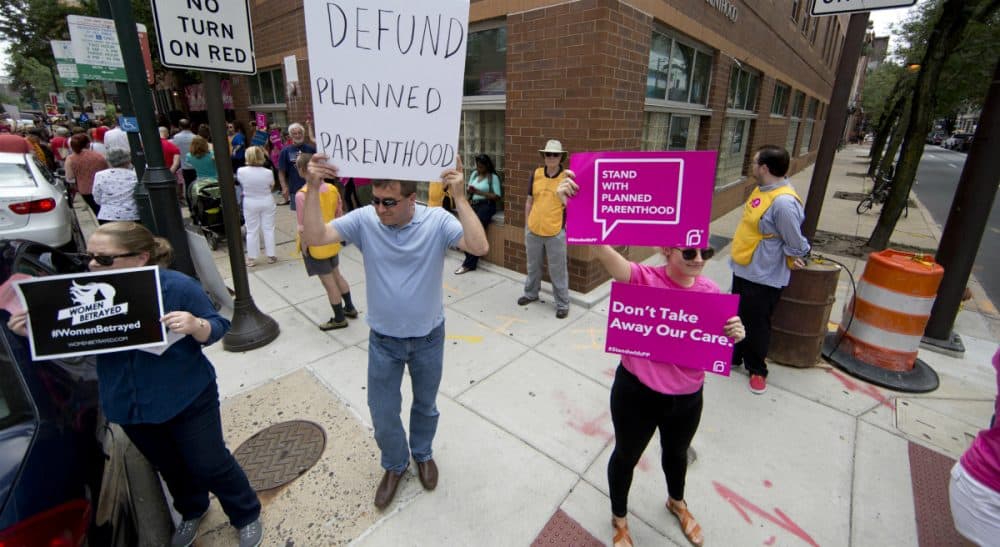Advertisement
Mass. Planned Parenthood Estimates Federal Defunding Would Cut $2 Million A Year In Payments

Republicans on Capitol Hill are once again aiming to defund Planned Parenthood, and Beltway oddsmakers are wagering that they have the best chance of succeeding in a long time.
What might defunding mean for Massachusetts, which has five Planned Parenthood clinics? Dr. Jennifer Childs-Roshak, president and CEO of the Planned Parenthood League of Massachusetts, says its clinics could no longer provide services to patients who get their health care through MassHealth, the state's Medicaid program.
The cuts would total about $2 million in MassHealth services a year, affecting roughly 10,000 patients and up to 10 percent of the league's budget, she says.
Here's our conversation, edited:
Dr. Roshak: A lot of people assume Planned Parenthood is just a line item in the budget somewhere. In fact, it’s not. We provide services for patients. We provide health care: pap smears, screening services, family planning, sexually transmitted infection testing, all of that. And we then provide a bill just like any other doctor's office, and when MassHealth pays the bill, about 90 percent of that money comes from the federal Medicaid budget. So that is what’s at risk.
There are absolutely zero federal dollars that pay for abortion, so there’s never any money anywhere, in any state, including in Massachusetts, that comes from the federal government to pay for abortion.
So the irony here is that the money that potentially could be cut, if this goes through, is all impacting preventive care and family planning.
And we are currently at the lowest rate of abortion and teen pregnancies ever. And the reason we are there is because patients have had expanded access to preventive care, to excellent forms of birth control, to birth control without co-pays, to long-acting reversible contraceptives with high efficacy. Those are the dollars that are being threatened now.
What are the numbers for Massachusetts?
We see overall about 30,000 patients in 50,000 visits across the state — and about 30 percent of our patients would be affected by that MassHealth/Medicaid cut for family planning and preventive care.
So something like 10,000 patients?
Right, and they would have to find care someplace else. A lot of times you hear the rhetoric on Capitol Hill: "Well, patients should just find another provider, they can go to a community health center, they can just go find someplace else." And the reality is, even here in Massachusetts, 40 percent of the towns have little or reduced access to primary care, and primary care means pap smears, STI testing, birth control, that’s very much a primary care opportunity. So for patients even in Massachusetts, where we think we’ve got services everywhere, it really becomes a burden.
Is access mainly a problem in central and western Massachusetts?
There are many ways that there are barriers to care for patients. Sometimes it’s geographic. Sometimes it’s related to stigma. About 20 percent of our patients come to see us even though they have a primary care OB/GYN someplace else. But they’d rather not have STI testing with their primary care clinician, or they don’t want to be seen going into the health center that’s in their neighborhood. That patient confidentiality piece is very critical as well. So there are many barriers to care.
Could Massachusetts offset or buffer federal defunding?
There could be state mitigation, but what would happen is that the state would have to make up the difference.
The reality is that we expect defunding to happen in waves, and this is the first wave. Then there will be a second wave and a third wave. There are multiple ways that funding will be chipped away, and we in Massachusetts will be affected. So anywhere from 10 percent to up to close to 50 percent of our budget could be affected.
What other waves do you expect?
Things like attacking and eliminating Title X. Title X was legislation put into place by President Nixon in the 1970s, and it was always intended, and continues to be, family planning availability for low-income women and families. So everywhere across the country, providers can provide low-income women with free family planning and pap-smear screening, those types of basic gynecological care. We fully expect that will be one of the waves. We also expect there could be some waves of attack on sex education.
